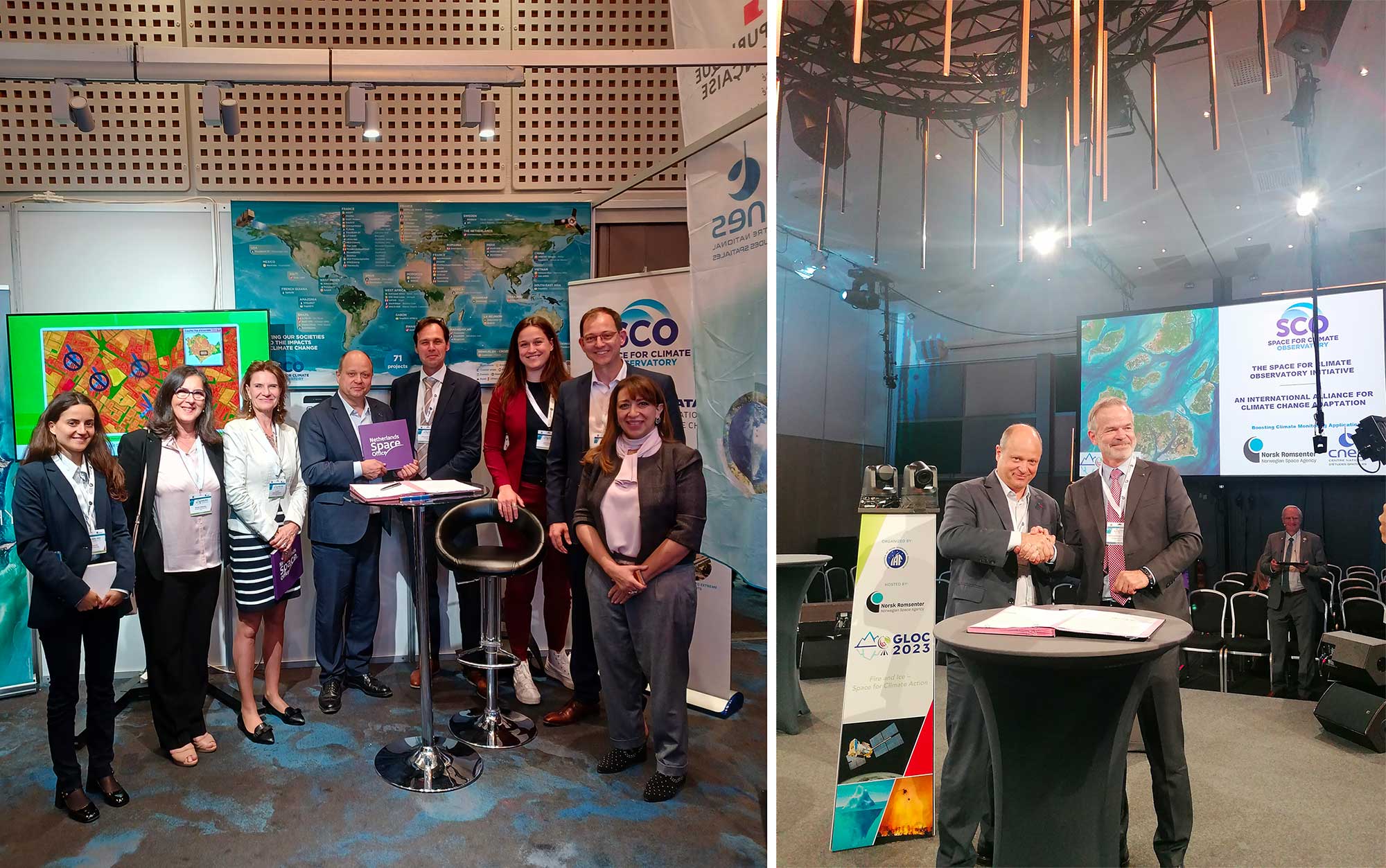The SCO at GLOC 2023
Co-organised by the IAF (International Astronautical Federation) and the Norwegian Space Agency (NOSA), GLOC 2023 (Global Space Conference on Climate Change) is the first international space conference devoted to climate change. It will contribute to the global effort to better understand and combat the impacts of climate change, based on the use of space data and technologies.
Inaugurated on the theme of "Fire and Ice", the GLOC in Oslo brought together more than 500 specialists from the space sector, representing 42 countries.
GLOC highlights
Perfectly in line with the SCO's philosophy, the conference focused mainly on the need to bridge the "last mile" between space data and technologies and the end users, particularly from civil society, by promoting the use of space applications. To this end, the SCO presented two emblematic projects: TropiSCO, for real-time detection of tropical forest loss using Sentinel-1 radar data, and Littoscope, a satellite-based solution to support coastal resilience.
Based on information sharing, collaborative solutions, feedback and the perspectives of each nation, the GLOC23 plenary sessions provided an informal opportunity to consolidate the first “Space Climate Action Plan” with a view to COP28.
At the end of this first GLOC, the IAF stresses the need to raise awareness among a wider public of the applications resulting from space, to encourage greater ministerial participation in this type of event and to promote inter-generational dialogue.
Two new members
On Tuesday 23 May, following the SCO's participation in the plenary session "Space as a toolbox for climate action now", two institutions signed the SCO Charter: the Norwegian Space Agency (NOSA), host of the GLOC, and its Dutch counterpart, the Netherlands Space Office (NSO).

On the left, signing of the SCO charter by the NSO (Netherlands) on the CNES stand in the presence of Sara Toffoletti, Selma Cherchali, Laurence Monnoyer-Smith and Lionel Suchet (CNES), Harm van de Wetering and Joanna Ruiter (NSO), Frédéric Bretar (CNES) and Shereen Zorba (UNEP). On the right, on the fringes of the "Declaration for a responsible space sector" forum, NOSA (Norway), represented by Christian Hauglie-Hanssen, also signed the SCO Charter alongside Lionel Suchet (CNES). © SCO
"Norway, represented by NOSA, supports the international Space for Climate Observatory initiative and we are pleased to be among the signatories of its Charter and to chair its 11th Steering Committee. We are delighted to contribute to the cooperation between space agencies from different countries and stakeholders dealing with concrete climate change issues that are already affecting our societies." Christian Hauglie-Hanssen, Director General of NOSA.
Under the banner of operational excellence, a decisive Steering Committee
On Wednesday 24 May, the 11th International Steering Committee brought together 48 representatives of the SCO signatories under the chairmanship of NOSA. Following the agenda aimed at stimulating the emergence of SCO projects and facilitating their scaling-up, strengthening the creation of local and regional SCOs, and raising awareness of SCO activities, this Committee validated the following elements:
- Adoption of the SCO Rules of Procedure: these are intended to implement the organization of the international subsidiary bodies and their meetings in order to strengthen the governance of the SCO's activities. 👉 Read the rules of procedure
- Setting-up the SCO Programme Committee: this body is responsible for overseeing the implementation of SCO activities through labelled projects and working groups on a wide range of subjects, from accreditation and promotion of international projects to identifying sources of added value and funding for emerging projects.
- Presentation of the work programme first version for 2023-2024: this covers the activities of the SCO projects, the working groups and the secretariat, as well as the national activities of the signatories wherever possible.
- Launch of the international accreditation process: based on the mechanism of calls for projects implemented by the SCO in France and Europe, the first international call for projects will be launched in 2023. To this end, an international group of examiners will be set up from among the SCO focal points.
- Setting-up the SCO Global Awareness Working Group: chaired by UNOOSA, this body specifically aims to increase SCO membership, including private sector actors, to raise awareness on SCO projects, particularly outside of the existing ecosystem, and to encourage networking and promotion of the SCO.



